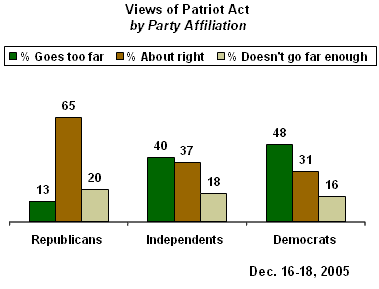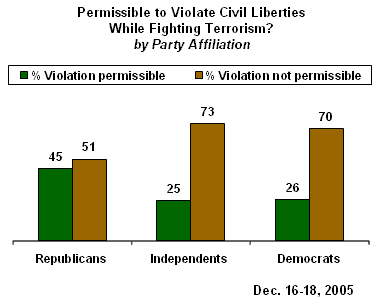|
Civil Liberties Poll
Gallup December 21, 2005Americans Protective of Civil RightsTwo-to-one majority opposes violation of civil rights in fight against terrorismby David W. Moore GALLUP NEWS SERVICE PRINCETON, NJ -- With President George W. Bush criticizing congressional Democrats and Republicans who have thus far blocked renewal of the Patriot Act, most Americans express reservations in principle about violating their civil rights in order to fight terrorism, though relatively few think the Patriot Act "goes too far." A recent CNN/USA Today/Gallup poll finds 65% of Americans saying that while the government should make efforts to fight terrorism, it should not take steps that violate basic civil liberties. On the other hand, 31% would allow the government to take counter-terrorism steps to prevent terrorism, "even if that means your basic civil liberties would be violated." Which comes closer to your view -- [ROTATED: the government should take all steps necessary to prevent additional acts of terrorism in the U.S. even if it means your basic civil liberties would be violated, (or) the government should take steps to prevent additional acts of terrorism but not if those steps would violate your basic civil liberties]? BASED ON 522 NATIONAL ADULTS IN FORM B
Americans were more permissive in their responses in a Jan. 2002 poll, only four months after the 9/11 terrorist attacks, when they were evenly divided about allowing the government to fight terrorism by violating basic civil rights -- 47% in favor, 49% opposed. But almost one year after 9/11, 62% of Americans were against, and just 33% in favor, of allowing civil rights violations in the war against terrorism -- a pattern of division that has persisted since then. When asked specifically about the Patriot Act -- a broad anti-terrorism law which was initially enacted shortly after 9/11 and expires at the end of this month, unless renewed by Congress -- 34% of Americans say the law goes too far in restricting people's civil liberties, 41% say it is about right, and 18% say it doesn't go far enough. These views are little changed from a similar measure last June. As you may know, shortly after the terrorist attacks on September 11, 2001, a law called the Patriot Act was passed. That law deals with the ways the federal government can obtain private information on people living in the U.S. who are suspected of having ties with terrorists. Based on what you have read or heard, do you think the Patriot Act -- [ROTATED: goes too far, is about right, or does not go far enough] -- in restricting people's civil liberties in order to investigate suspected terrorism? BASED ON 481 NATIONAL ADULTS IN FORM A
Partisan Differences Given that President Bush and most congressional Republicans support the Patriot Act, while most Democrats (and only a few Republicans) oppose it, public opinion about this matter is likely to be highly related to party affiliation. The poll confirms that hypothesis: Only 13% of Republicans say the law goes too far, compared with 40% of independents and 48% of Democrats. On the other hand, 65% or Republicans say the law is about right, compared with 37% of independents and 31% of Democrats.
The poll finds a similar pattern on whether the government should be able to violate basic civil liberties while fighting terrorism. A slight majority of Republicans, 51%, opposes such violations, compared with 73% of independents and 70% of Democrats.
Survey Methods Results are based on telephone interviews with 1,003 national adults, aged 18 and older, conducted Dec. 16-18, 2005. For results based on the total sample of national adults, one can say with 95% confidence that the maximum margin of sampling error is ±3 percentage points. For results based on the 481 national adults in the Form A half-sample and 522 national adults in the Form B half-sample, the maximum margins of sampling error are ±5 percentage points. In addition to sampling error, question wording and practical difficulties in conducting surveys can introduce error or bias into the findings of public opinion polls. |
|||||||||||||||||||||||||||||||||||||||||||||||||||||||||||||||||||||||||||

